Advances in Animal, Human and Ecosystem Health
We strive to develop science-based approaches for sustaining a healthier world. By improving knowledge, understanding and capacity at the interface of domestic animal health, wildlife health, and human health and livelihoods, environmental stewardship can be enhanced today and for the future.
To achieve this, we are committed to the health of individual animals and herds, as well as to building international program and partnerships. Read our 2018-2022 Strategic Plan for more.
While COVID-19 caused a dip in cases at the Cornell Univeristy Hospital for Animals early in 2020, by the end of the fiscal year, visits steadily increased.
CUHA Cases at a Glance
Cornell University Hospital for Animals
Caseload by species
| Species | Caseload |
|---|---|
| Canine | 16,040 |
| Feline | 3,209 |
| Equine | 1,290 |
| Avian & wildlife | 1,022 |
| Bovine | 177 |
| All other large animal | 457 |
| All other small animal | 1,520 |
| Total (all small and large animal) | 23,715 |
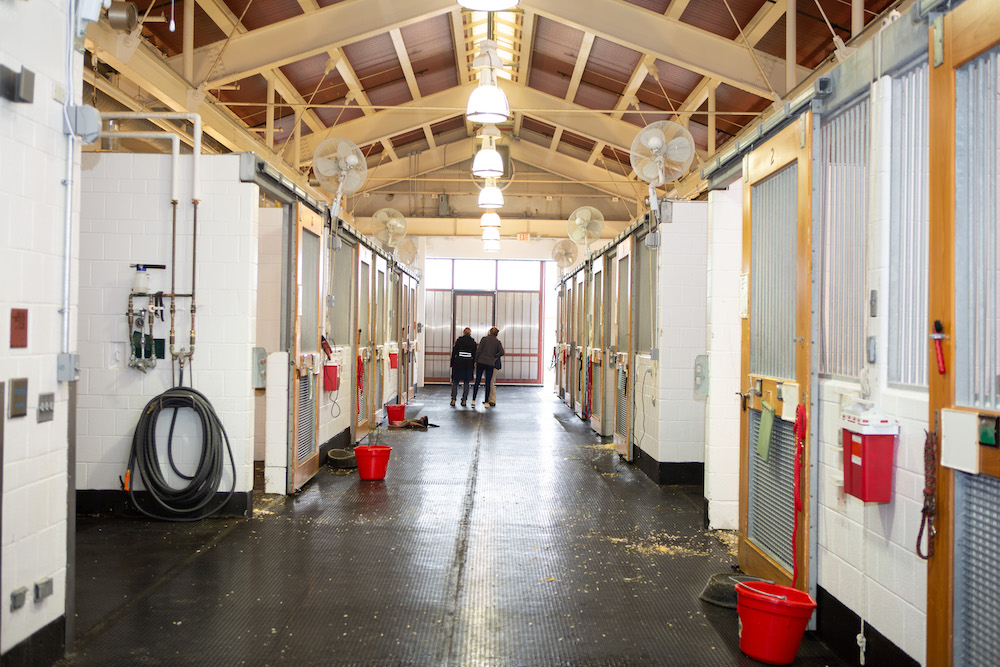
Caseload by month
Note the pandemic-induced dip in April and subsequent recovery.
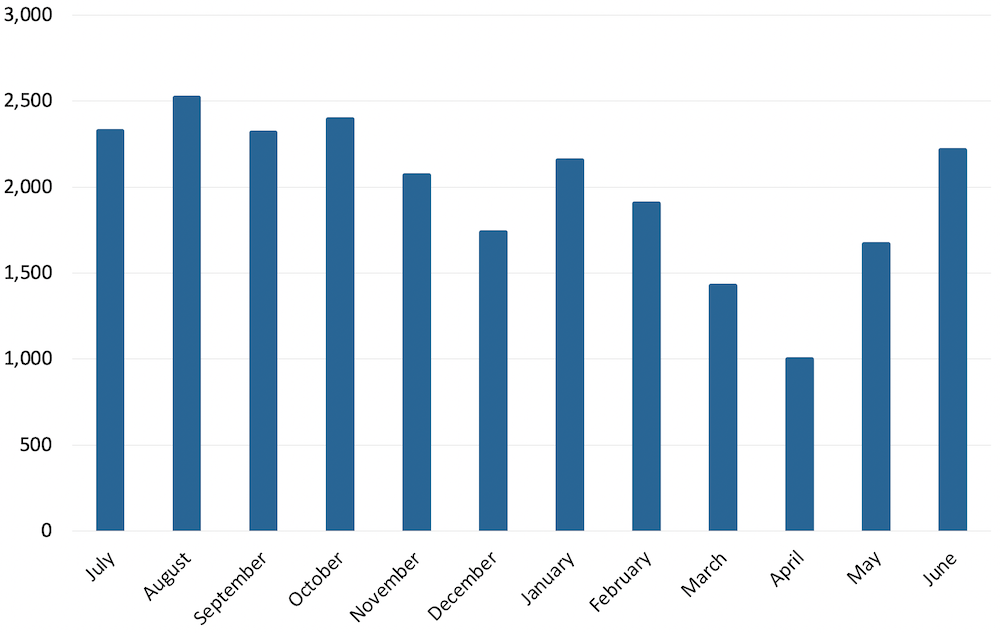
Caseload by month data table
| Month | CUHA Caseload |
|---|---|
| July | 2,325 |
| August | 2,519 |
| September | 2,316 |
| October | 2,394 |
| November | 2,066 |
| December | 1,736 |
| January | 2,153 |
| February | 1,904 |
| March | 1,424 |
| April | 999 |
| May | 1,666 |
| June | 2,213 |
Clinician kudos
Roberto Santilli, winner of the 2019 CUHA Outstanding Clinical Service Award
Janet L. Swanson Wildlife Hospital
Caseload by species
| Year | Total caseload | Avian | Mammal | Reptile |
|---|---|---|---|---|
| 2016 | 943 | 546 | 350 | 47 |
| 2017 | 1,125 | 669 | 392 | 64 |
| 2018 | 1,338 | 847 | 436 | 55 |
| 2019 | 1,416 | 852 | 485 | 79 |
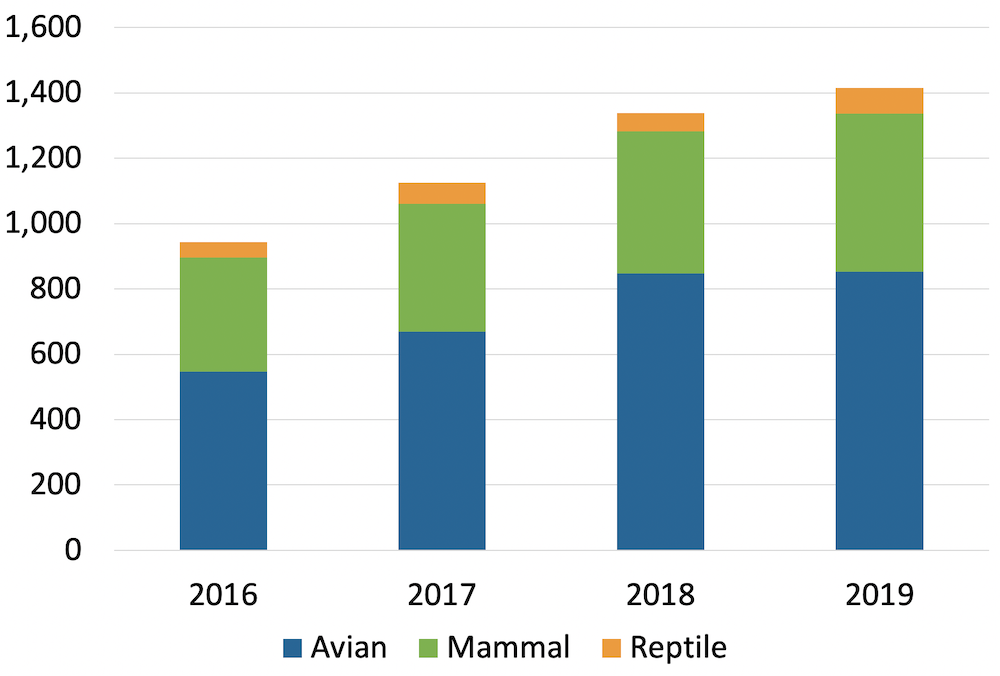
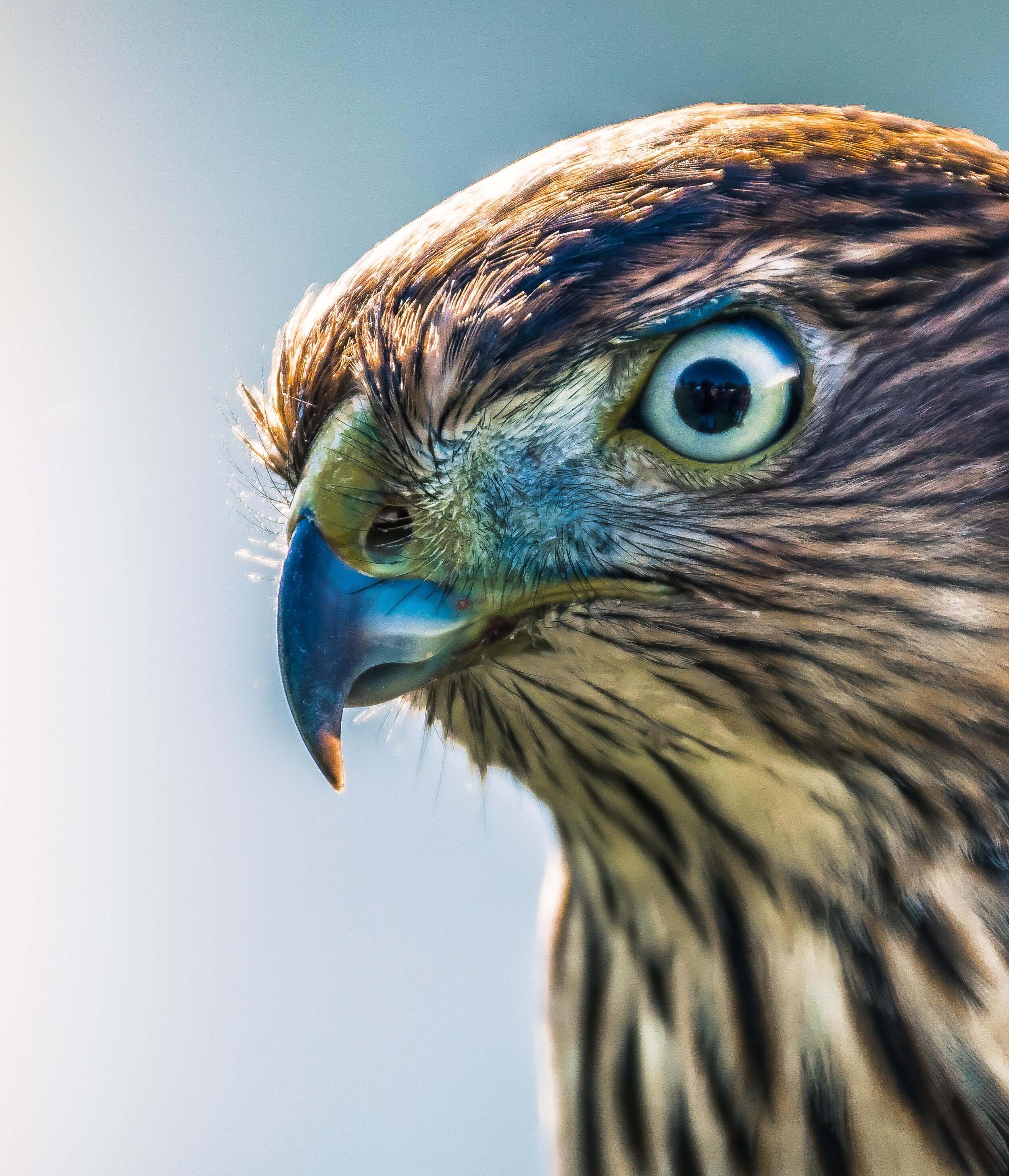
Cornell University Veterinary Specialists
Stamford, Connecticut
- 0.5% caseload decrease vs. fiscal year 2019 due to COVID-19
- 140 staff
- 13 specialists
- 16 student externs. Note: All externs canceled from March 2020 due to COVID-19
Cornell Wildlife Health Center
The Cornell Wildlife Health Center was officially launched this year — supported by our new website and a newly formed steering committee — to address wildlife health challenges worldwide while immersing students in unique learning experiences at home and abroad. The center unites wildlife health professionals and other stakeholders from across the college, the university and the world, with a mandate for moving science into policy and action — for developing long-term solutions that benefit the health of people and nature alike.
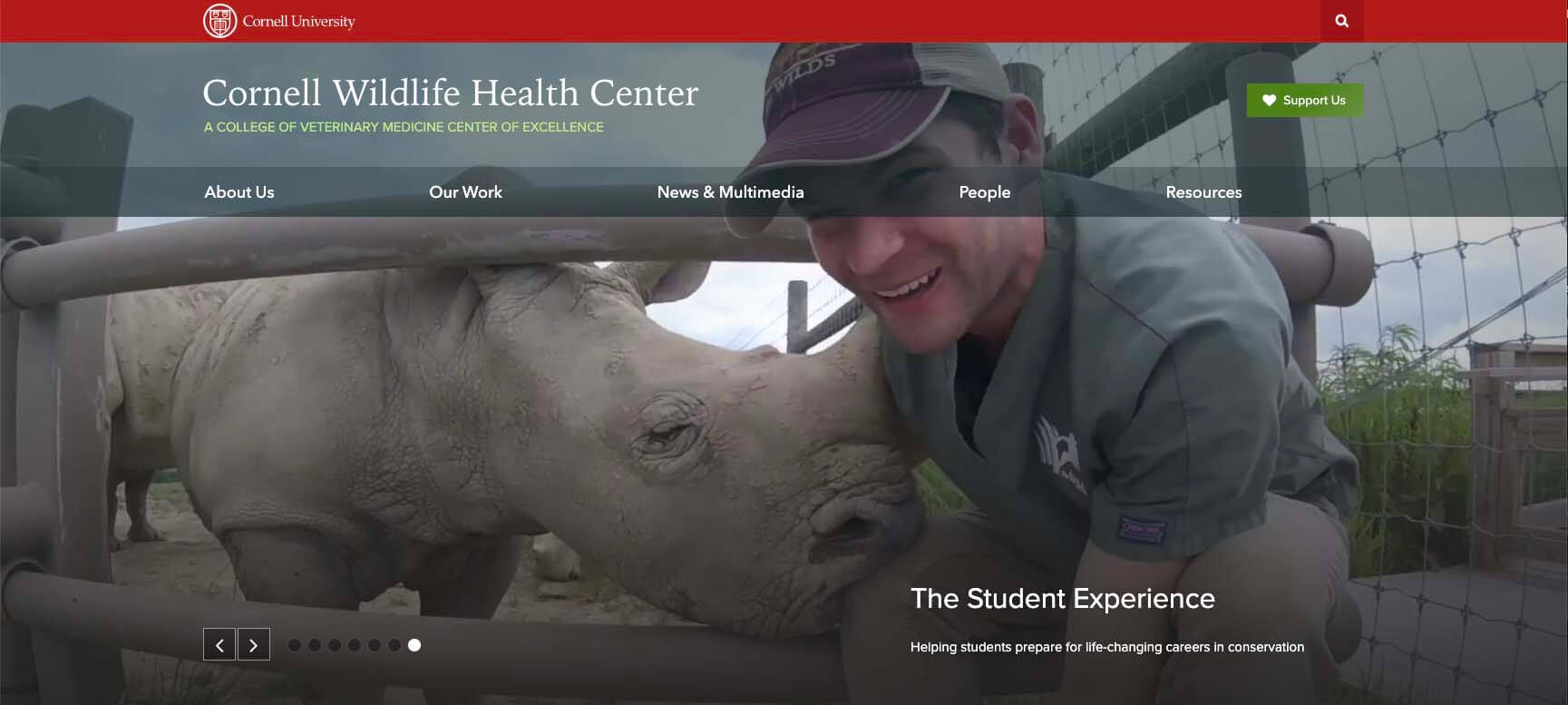
Outreach and COVID-19-Related Efforts
- Officially launching the Cornell Wildlife Health Center and website
- Assisted congressional offices with drafting bipartisan legislation to shut down commercial wildlife markets that pose a threat to global public health as well as biodiversity
- Published research providing new evidence of virus risks from the wildlife trade and their amplification along the supply chain that could increase dangers for end consumers
- Provided guidelines for wildlife rehabilitators to mitigate the risk of wildlife under their care getting exposed to SARS-CoV-2
New York State Projects
- Diagnosis of freshwater fish diseases
- Promoting non-lead ammunition to reduce the threat of lead toxicity to people and ecosystems, including in bald eagles
- Addressing rodenticide poisoning in raptors and small mammals
- Pathogen and species detection using novel environmental DNA techniques
Projects in the Northeast and Other States
- Chronic wasting disease affecting deer, elk and moose
- Avian malaria in Hawaiian wild birds
- Guidelines for wildlife rehabilitators to prevent Rabbit Hemorrhagic Disease Virus 2
- Developed advanced molecular diagnostics to detect fungal disease in porcupines
Worldwide Projects
- Improving the coexistence of wildlife, livestock and people in Asia and Africa
- Investigating the threat of canine distemper virus to tigers in India, Nepal, Indonesia and Thailand
- Immersing veterinary and undergraduate students in fieldwork, such as in Indonesia, Tajikistan, Kyrgyzstan, Uganda and the Republic of Congo
- Undertaking emergency investigations of mysterious rhino deaths in Nepal
Learn more about our ongoing projects by visiting our new website as well as our section in last year's annual report.
International Programs
Enhancing worldwide veterinary care with international partnerships
CVM continues to expand its global presence and is working with a number of international partners to strengthen veterinary and public health capacity and advance animal, human and ecosystem health. Institutional partners are in 21 countries, including:
- Obihiro University
- City University of Hong Kong Jockey Club College of Veterinary Medicine and Life Sciences
- University of Ghent
Although COVID-19 has slowed some of these activities, we continue to foster research exchanges through the Joint Interdisciplinary Ph.D. Program between CVM and City University of Hong Kong:
Animal Health Diagnostic Center
Diagnostic services and expert advice for professionals and the public
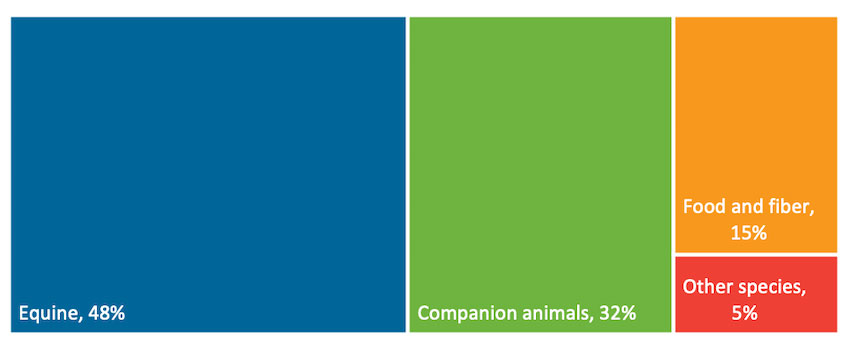
| State | Number of Accessions |
|---|---|
| New York | 85,371 |
| Pennsylvania | 13,539 |
| Massachusetts | 11,000 |
| California | 9,550 |
| Florida | 7,623 |
| Virginia | 6,446 |
| Maryland | 5,597 |
| Missouri | 5,507 |
| New Jersey | 5,022 |
| Connecticut | 4,947 |
| Vermont | 4,065 |
| All Other States | 50,661 |
| International | 4,041 |
| Total Accessions Processed | 225,148 |
| Species | Number of Accessions |
|---|---|
| Equine | 109,516 |
| Canine | 61,668 |
| Bovine | 30,209 |
| Feline | 11,409 |
| Avian | 2,701 |
| Caprine | 2,612 |
| Ovine | 1,160 |
| Cervidae | 781 |
| Rodentia | 759 |
| Environmental | 677 |
| Camelids | 655 |
| Porcine | 572 |
| Primates | 547 |
| Mustelidae | 388 |
| Reptiles | 380 |
| Cetacea | 304 |
| Lagomorpha | 256 |
| All Other Species | 1,497 |
| Total Accessions Processed | 225,148 |


